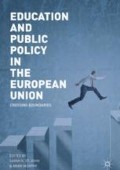Abstract
This chapter brings together the set of case studies presented in this volume, emphasising the interplay between education and other forms of public policy, such as health, agriculture, migration, digital media and communications, environment and language. The conclusion highlights the strong message coming through from the chapters that education is the policy adhesive that can both help tie policy domains together and deliver on the promise of implementation. The conclusion explores the evidence of spillover among the policy domains presented in the case studies, drawing on those connections between education, learning and European public policy, as well as exploring the notion of education as a force for cultural and political change.
Access this chapter
Tax calculation will be finalised at checkout
Purchases are for personal use only
Bibliography
Boon, V. (2007). Jürgen Habermas’ Writing on Europe: Not Habermasian Enough? Ethical Perspectives. Journal of the European Ethics Network, 14, 301–302.
Burgess, P. (2002). What’s so European About the European Union? Legitimacy Between Institution and Identity. European Journal of Social Theory, 5(4), 467–481.
Dinan, D., Nugent, N., & Paterson, W. (2017). The European Union in crisis. London: Palgrave.
Edwards, G. (2007). Habermas, Activism and Acquiescence: Reactions to Colonization in UK Trade Unions. Social Movement Studies, 6(2), 111–130.
Edwards, G. (2008). The Lifeworld as a Resource for Social Movement Participation and the Consequences of Its Colonization. Sociology, 42, 299–316.
Edwards, G. (2009). Public Sector Unionism in the UK: Strategic Challenges in the Face of Colonization. Work, Employment and Society, 23(3), 442–459.
Elken, M. (2015). Developing Policy Instruments for Education in the EU: The European Qualifications Framework for Lifelong Learning. International Journal of Lifelong Education, 34(6), 710–726.
Field, J., & Murphy, M. (2006). Governance and the Learning Citizen: Tensions and Possibilities in the Shift from National to Post-National Identities. In M. Kuhn & R. Sultana (Eds.), Homo sapiens Europaeus? Creating the European Learning Citizen. New York: Peter Lang.
Forbes, J., & Watson, C. (2015). Introducing the Complexities of Inter/Professional Working. In J. Forbes & C. Watson (Eds.), The Transformation of Children’s Services: Examining and Debating the Complexities of Inter/Professional Working. London: Routledge.
Habermas, J. (1989). The Structural Transformation of the Public Sphere: An Enquiry Into a Category of Bourgeois society. Boston: MIT Press.
Habermas, J. (1990). Moral Consciousness and Communicative Action. Cambridge, MA: MIT Press.
Habermas, J. (1994). Citizenship and National Identity. In B. van Steenbergen (Ed.), The Condition of Citizenship. London: Sage. Accessed online on 17 Dec 2015 at http://sk.sagepub.com/books/the-condition-of-citizenship/n3.xml
Habermas, J. (1998). The Inclusion of the Other. Cambridge, MA: MIT Press.
Habermas, J. (2001). The Postnational Constellation: Political Essays. Cambridge: Polity Press.
Habermas, J. (2009). Europe: The Faltering Project. Cambridge: Polity Press.
Habermas, J. (2012). The Crisis of the European Union: A Response. Cambridge: Polity Press.
Habermas, J. (2015). The Lure of Technocracy. Cambridge: Polity Press.
Hake, B. (1994). The Making of Batavian Citizens: Social Organization of Constitutional Enlightenment in the Netherlands, 1795–98. History of Education, 23(4), 335–353.
Hansen, P., & Hager, B. (2010). The Politics of European Citizenship: Deepening Contradictions in Social Rights and Migration Policy. New York: Berghahn Books.
Ifversen, J. (2002). Europe and European Culture – a Conceptual Analysis. European Societies, 4(1), 1–26.
Keat, R. (2009). Habermas on Ethics, Morality and European Identity. Critical Review of International Social and Political Philosophy, 12(4), 535–557.
Magnette, P. (2007). How Can One Be European? Reflections on the Pillars of European Civic Identity. European Law Journal, 13(5), 664–679.
Murphy, M. (2003). Covert Action? ‘Education, Social Policy and Law in the European Union’. Journal of Education Policy, 18(5), 551–562.
Murphy, M. (2005). Between Facts, Norms and a Post-National Constellation: Habermas, Law and European Social Policy. Journal of European Public Policy, 12(1), 143–156.
Pépin, L. (2006). The History of European Cooperation in Education and Training. Europe in the Making – An Example. Luxembourg: Office for Official Publications of the European Communities.
Riddell, S., & Tett, L. (2001). Education, Social Justice, and Inter-agency Working: Joined up or Fractured Policy? London: Routledge.
Scalise, G. (2015). The Narrative Construction of European Identity: Meanings of Europe “From Below”. European Societies, 17(4), 593–614.
Scicluna, N. (2012). When Failure Isn’t Failure: European Union Constitutionalism After the Lisbon Treaty‘. Journal of Common Market Studies, 50(3), 441–456.
Turner, C. (2004). Jürgen Habermas: European or German? European Journal of Political Theory, 3(3), 293–314.
Author information
Authors and Affiliations
Corresponding author
Editor information
Editors and Affiliations
Rights and permissions
Copyright information
© 2019 The Author(s)
About this chapter
Cite this chapter
Murphy, M., St. John, S.K. (2019). Conclusion. In: St. John, S., Murphy, M. (eds) Education and Public Policy in the European Union. Palgrave Macmillan, Cham. https://doi.org/10.1007/978-3-030-04230-1_9
Download citation
DOI: https://doi.org/10.1007/978-3-030-04230-1_9
Published:
Publisher Name: Palgrave Macmillan, Cham
Print ISBN: 978-3-030-04229-5
Online ISBN: 978-3-030-04230-1
eBook Packages: Political Science and International StudiesPolitical Science and International Studies (R0)

